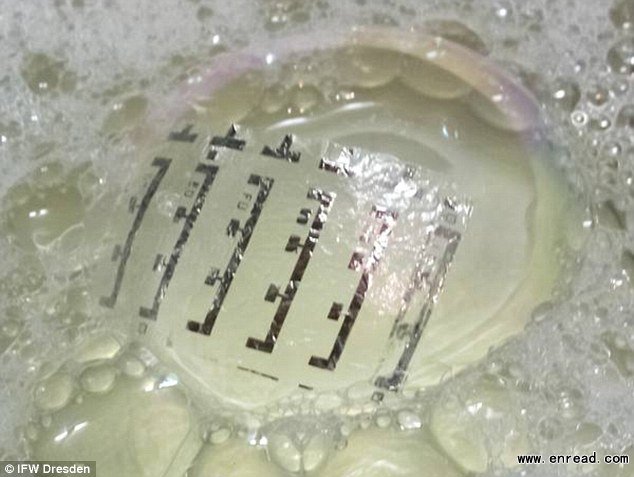新型传感器让人类拥有探测磁场的能力
(单词翻译:单击)
Researchers have unveiled a new type of sensor1 that could give humans the ability to detect magnetic fields.
研究人员日前发布了一款新型传感器,可让人类拥有探测磁场的能力。

It works in the same way as bacteria, insects and even vertebrates like birds and sharks detect magnetic fields for orientation2 and navigation.
Humans are, however, unable to perceive magnetic fields naturally.
Dr. Denys Makarov and his team have developed an electronic skin with a magneto-sensory system that equips the recipient3 with a "sixth sense" able to perceive the presence of static or dynamic magnetic fields.
"These ultrathin magnetic sensors4 with extraordinary mechanical robustness6 are ideally suited to be wearable, yet unobtrusive and imperceptible for orientation and manipulation aids." adds Prof. Oliver G. Schmidt, who is the director of the Institute for Integrative Nanosciences at the IFW Dresden.
It is hoped they could be used for navigation, and in robotics.
"It could lead to wearable as imperceptible magneto-sensitive skin that enables proximity7 detection, navigation and touchless control," the researchers wrote.
The magneto-electronics are less than two micrometers thick and weights only three gram per square meter; they can even float on a soap bubble.
The new magnetic sensors withstand extreme bending with radii8 of less than three micrometer, and survive crumpling9 like a piece of paper without sacrificing the sensor performance.
On elastic10 supports like a rubber band, they can be stretched to more than 270 percent and for over 1,000 cycles without fatigue11.
These versatile12 features are imparted to the magnetoelectronic elements by their ultra-thin and –flexible, yet robust5 polymeric support.
'We have demonstrated an on-skin touch-less human-machine interaction platform, motion and displacement13 sensorics applicable for soft robots or functional14 medical implants15 as well as magnetic functionalities for electronics on the skin', says Michael Melzer.
"Future electronic skin aims to mimic16 nature’s original both in functionality and appearance," the researchers wrote in Nature communications.
"Electronics opens a unique path that leads beyond imitation and could equip us with unfamiliar17 senses.
"These ultrathin magnetic field sensors readily conform to ubiquitous objects including human skin and offer a new sense for soft robotics, safety and healthcare monitoring, consumer electronics and electronic skin devices.
 收听单词发音
收听单词发音
1
sensor

|
|
| n.传感器,探测设备,感觉器(官) | |
参考例句: |
|
|
|
2
orientation

|
|
| n.方向,目标;熟悉,适应,情况介绍 | |
参考例句: |
|
|
|
3
recipient

|
|
| a.接受的,感受性强的 n.接受者,感受者,容器 | |
参考例句: |
|
|
|
4
sensors

|
|
| n.传感器,灵敏元件( sensor的名词复数 ) | |
参考例句: |
|
|
|
5
robust

|
|
| adj.强壮的,强健的,粗野的,需要体力的,浓的 | |
参考例句: |
|
|
|
6
robustness

|
|
| 坚固性,健壮性;鲁棒性 | |
参考例句: |
|
|
|
7
proximity

|
|
| n.接近,邻近 | |
参考例句: |
|
|
|
8
radii

|
|
| n.半径;半径(距离)( radius的名词复数 );用半径度量的圆形面积;半径范围;桡骨 | |
参考例句: |
|
|
|
9
crumpling

|
|
| 压皱,弄皱( crumple的现在分词 ); 变皱 | |
参考例句: |
|
|
|
10
elastic

|
|
| n.橡皮圈,松紧带;adj.有弹性的;灵活的 | |
参考例句: |
|
|
|
11
fatigue

|
|
| n.疲劳,劳累 | |
参考例句: |
|
|
|
12
versatile

|
|
| adj.通用的,万用的;多才多艺的,多方面的 | |
参考例句: |
|
|
|
13
displacement

|
|
| n.移置,取代,位移,排水量 | |
参考例句: |
|
|
|
14
functional

|
|
| adj.为实用而设计的,具备功能的,起作用的 | |
参考例句: |
|
|
|
15
implants

|
|
| n.(植入身体中的)移植物( implant的名词复数 ) | |
参考例句: |
|
|
|
16
mimic

|
|
| v.模仿,戏弄;n.模仿他人言行的人 | |
参考例句: |
|
|
|
17
unfamiliar

|
|
| adj.陌生的,不熟悉的 | |
参考例句: |
|
|
|
- 上一篇:科学家成功将人体衰老细胞转换成年轻细胞
- 下一篇:微软Band添加虚拟键盘




